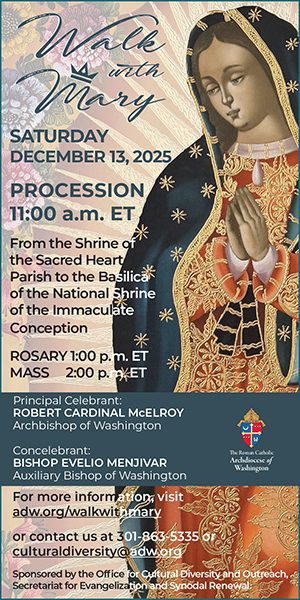Their roots go back to the earliest years of the Catholic Church, and in Washington, they’ve worshipped together for 35 years. Now the Kidane-Mehret Ge’ez Rite Ethiopian Catholic Church in the Archdiocese of Washington has embarked on a fundraising drive so that community can have a church of its own.
“For the Ethiopian people, the church is central to their life. If you go anywhere, the church is their focus, it’s like their second home,” said Father Abayneh Gebremichael, a priest of the Archdiocese of Addis Ababa, Ethiopia, who serves as the pastor of Kidane-Mehret.
That, he said, underscores the need for the community to have its own church building, where they can worship together and continue to provide educational and charitable outreach.
Since Kidane-Mehret was established in 1984, its members have worshipped in several locations in Washington, D.C., first at St. Gabriel Church, then at chapels at the Basilica of the National Shrine of the Immaculate Conception and Theological College, then at the former building of All Saints High School near St. Anthony Church, then at St. Vincent de Paul Church, and since September, at the St. Ursula Chapel of the Archdiocese of Washington’s Pastoral Center in Hyattsville, Maryland.

The growing community has about 230 families. Their Divine Liturgy at 9:30 a.m. on Sundays is celebrated in Amharic, the official language of Ethiopia, and in Ge’ez, a classical language of Ethiopia still used as a liturgical language for Ethiopian Christians. “Kidane-Mehret” translated from Ge’ez to English means “Covenant of Mercy.” As in other Eastern Rites, most of the liturgy is sung.
“Our Christianity started in the first century,” said Father Gebremichael, who noted that in Acts 8, the apostle Philip baptized the Ethiopian eunuch. That faith today, he said, continues to be “deep-rooted in the hearts” of Ethiopian people, who have a strong love for Mary.
Their faith and devotion could be seen at their Divine Liturgy on Oct. 27, when visiting Ethiopian Cardinal Berhaneyesus Souraphiel of Addis Ababa administered the sacraments of First Holy Communion and Confirmation to young members of that community. On Oct. 19, the cardinal participated in a special event at the Catholic University of America to raise funds for a future church for Kidane-Mehret.
The opening procession for the nearly three-hour liturgy included a man playing a traditional drum. The standing-room congregation included many families, including women wearing scarves and long cotton dresses. The concelebrants included Father Gebremichael and also Father Tesfamariam Baraki, who served as the founding pastor of Kidane-Mehret when it began with about 50 members and led the community for 17 years, baptizing between 300 and 400 children there and presiding at more than 90 marriages. Since 2001, he has served as a chaplain at Howard University Hospital.

Addressing the children about to receive their First Holy Communion, Cardinal Souraphiel said, “I’m happy to see you, because you are the fruit of this parish. Your parents love you. Your parish priest loves you. And more than that, the Lord loves you.” He added that now “you will be one with the rest of the faithful here. The community will be your support.”
And he encouraged the youth about to be confirmed to be strong witnesses of the faith, saying, “You should not hide your faith… Keep the faith, whatever comes… Pray to the Holy Spirit to keep you strong.”
At a reception afterward, members of Kidane-Mehret reflected on what that community means to them.
Mariamawit Yohannes, noted that she was baptized and grew up in the Kidane-Mehret community and now at the age of 30, continues to be a part of it.
“Being able to communicate God’s message in the language of your birth is very important… I feel really engaged,” said Yohannes, who is studying business at the University of Maryland’s University College while working full-time in tech support for Apple.

Eyob Kebede, a 67-year-old retired chemist, was born in Ethiopia and grew up listening to the Eastern Rite liturgy. After immigrating to the United States, she has been attending Kidane-Mehret for the past 30 years. Passing on the faith to the next generation is important, she said, adding that having a church of their own “is very, very important, not just for us, but more so for the generation to come.”
That point was echoed by Fana Assafa, another native of Ethiopia who immigrated to the United States as a teen-ager and has been attending Kidane-Mehret for the past 25 years. Her daughter received First Holy Communion there four years ago. “It continues to build on a foundation I was given back home, hearing the liturgy in my language, singing songs I sang when I was little,” said Assafa, who works as a skin care specialist. “Now we are passing that legacy onto our children.”
Noting that her daughter received her First Holy Communion there four years ago, she echoed the point about needing a church, saying, “Our children will continue to have that sense of community, oneness and identity.”

Yeshimebet Retta, a microbiologist who is helping to lead Kidane-Mehret’s fundraising committee, said building a church of their own is “extremely, extremely important.” She is part of a group there dedicated to the Sacred Heart of Jesus that visits the sick and feeds the homeless. Retta also teaches children about Ethiopian culture and the Amharic language. Members there also teach religious education, sing in the choir and participate in prayer groups. Everything their community does, she said, “will get better and bigger if we have our church.”
Speaking of Kidane-Mehret’s effort to build a church for its community, Father Gebremichael said, “This is a time for us to stand in our faith… That is our future home, to preserve our Christianity.”
(Information on supporting Kidane-Mehret can be found at www.kidane-mehret.org.)













